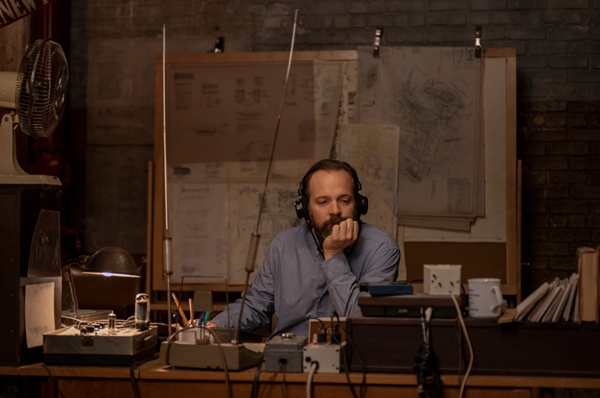Toward the end of Michael Tyburski’s debut feature, Peter Lucian (Peter Sarsgaard) approaches the editor of The New American Journal of Sound. He has a complex theory of how the sounds of each neighborhood in New York City, as translated into musical chords, affect the behavior of the people who live there, and he has submitted this theory for her approval. He is breathless, giddy, excited for her feedback. At first, she does not know who he is, and then, as she begins to put the pieces together, she says, in so many words, that she was astounded by his theory, not because she was at all convinced by it but because she was shocked that he actually took it seriously.
Unfortunately, the filmmakers could have used a similar message. What begins as a charming, unlikely premise does not deepen as the film progresses but becomes incrementally more ridiculous.
Peter Lucien is a house tuner. In other words, he is hired to go into the homes of the depressed, the sleep-deprived, the anxious, or all of the above, and listen deeply. His arcane practice consists of hitting tuning forks, tape recording, listening through headphones, and even replicating his clients’ morning routines. After doing so, he assesses the problem, and he will tell his clients to get rid of a toaster, for instance, the tone of which is creating a dissonant harmony with the fridge and the overall sound of the apartment. Once his clients have done what he says, their anxieties will subside, they will be able to sleep, and peace will return. Lucien has a high success rate and has been featured in The New Yorker.
Tyburski and his collaborators made the most of their very low budget and found creative ways to illustrate Peter’s hypersensitivity to sound. The intricate soundscape cuts to near silence when Peter listens closely, and is other times peppered with classical music. Calm and stillness is contrasted sharply, and very effectively, with the pounding noise of the city. In one subtle but impressive scene, especially considering the budget, all of New York City goes dark in a power outage.
The premise is charming and full of promise, especially if the director had intended to take it in a humorous direction, or at least in a direction that fully embraced its inherent wackiness. Though it never fully abandons its sly sense of humor, the movie moves toward a much more sober direction, because Peter’s efforts are somewhat doomed. He tries to promote his grand theory to the PhD students of his Columbia professor friend (Austin Pendleton), who postpones discussion of it. A massive corporation attempts to hire him for their own ends. Peter refuses but falls prey to their machinations. A lonely client, Ellen (Rashida Jones), has a case in her apartment that he can’t fully crack, and it eventually leads him to question his own beliefs.
The premise does not lend itself to the line of inquiry it follows, and the charm of the beginning has vanished by the time the credits roll. This might be because the characters, other than Peter, are thinly drawn. Jones has the unfortunate job of trying to bring life to a character whose main function is to provide a rational foil to Sarsgaard’s madness, and it’s a thankless task. It might also be that the idea of a house tuner is simply too odd to encompass the filmmaker’s broader concerns about people and their struggles against the rest of the world.
Either way, one finishes the film utterly exasperated by its absurdity. It’s well meaning, and may very well find its fans, if only for the novelty of its story line. Others will pass and will be none the worse for it.







Leave A Comment